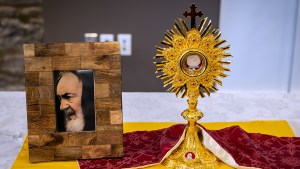The remains of two Ugandan Christian martyrs will soon be repatriated in the African nation, after spending over a century in Rome. These men were executed, in part, due to a king’s fear of the growing influence of Christianity. Now they are returning in hopes that they will bring with them a revival of faith and hope in Uganda, now a majority Christian nation.
Aleteia’s Meg Hunger-Kilmer has previously reported on the late-19th century execution of the Ugandan Martyrs. While King Mutesa of Uganda, who was secretly baptized on his deathbed, was open to the presence of other religions in his kingdom, his son and successor King Mwanga was not. He was well known for a fractious relationship with the Church, as well as his rampant sexual harassment and abuses of his Christian pages:
“Though Mwanga’s Christian pages were eager to obey their king (kabaka in the local tongue), this was one area where they felt compelled to resist. Unlike many who are sexually abused by people in positions of power, these young men had known going into this situation what they would face. They had been prepared by other Christians and encouraged to refuse the kabaka’s advances.”
In 1885, the king ordered execution of an Anglican bishop and several missionaries, which St. Joseph Mukasa, a Christian in King Mwanga’s court, challenged. Mukasa had long worked to protect Christians – as well as the harassed pages – from the king’s ire and attention, and Mwanga had grown tired of dealing with Mukasa. Mukasa was also ordered executed when he refused to relent in his requests to offer the Anglicans a reprieve. In fact, the king changed his mind about Mukasa’s execution, but his order to stay the execution arrived after his sentence was carried out.
Touched by the witness and martyrdom of Mukasa, a young man named Charles Lwanga was baptized on the same night of Mukasa’s execution. Lwanga took up Mukasa’s mantle and worked to protect the Christian pages from the king, but about six months after Mukasa’s death, the king executed St. Denis Ssebuggwawo and threw all the Christian pages in prison. The Ugandan Martyrs were each executed, with most of them burned alive, and their remains were left at every major crossroad in Uganda.
Their remains were mostly unable to be recovered, as animals got at them while they were left at the crossroads. But the remains of St. Charles Lwanga and St. Matiya Mulumba were able to be recovered and sent to Rome, where the Ugandan Martyrs were canonized by Pope St. Paul VI in October 1964.
The return of these saints’ remains will coincide with the 60th anniversary of their canonization.
The AFP reports that after their return, the remains will first be displayed at the Uganda Martyrs University beside artifacts including a chain used during the executions and a cross made from the mvule tree. After this display, they are expected to be housed in a shrine at Namugongo, where they will be available to be venerated by pilgrims and visitors.
Read more about the Ugandan Martyrs at Aleteia.




